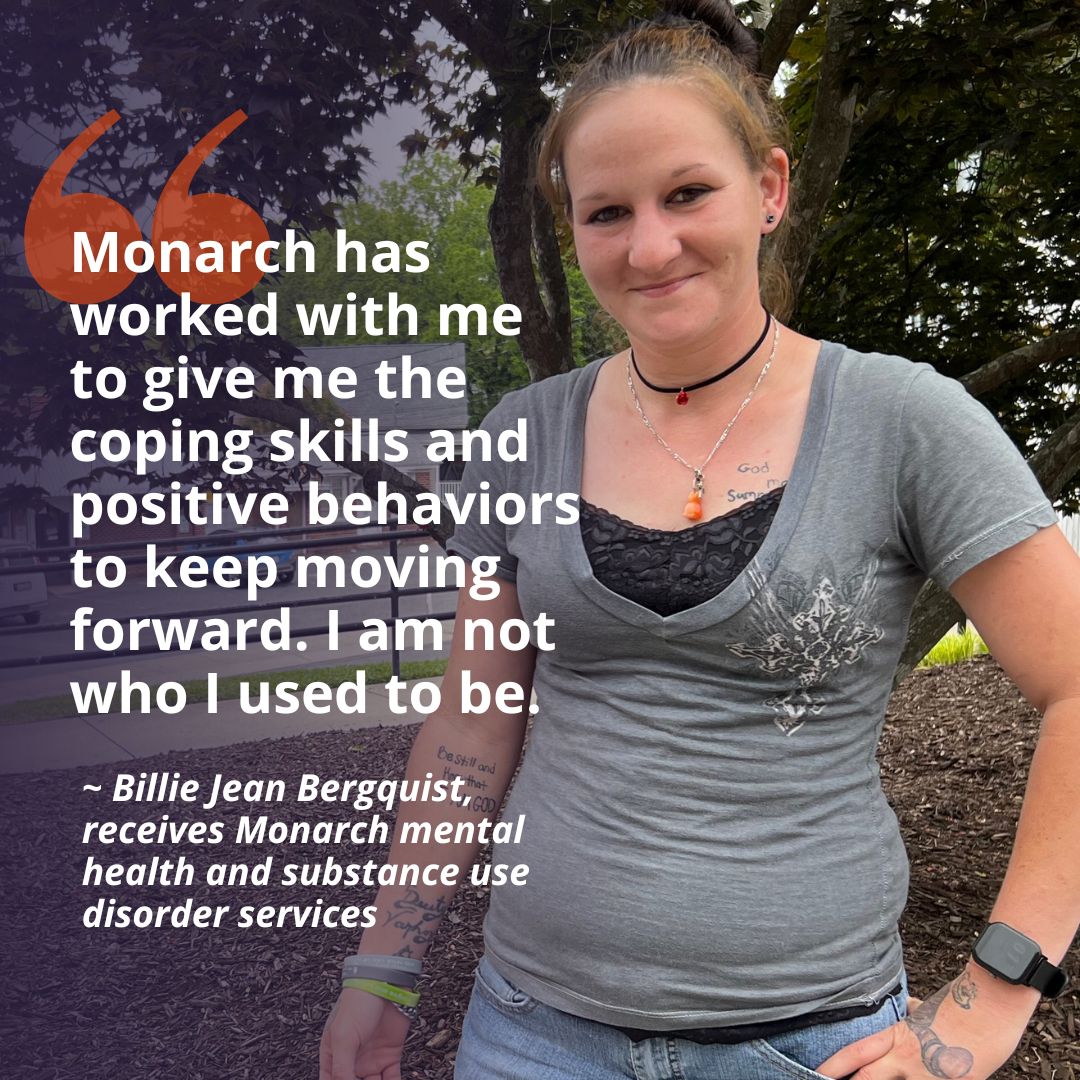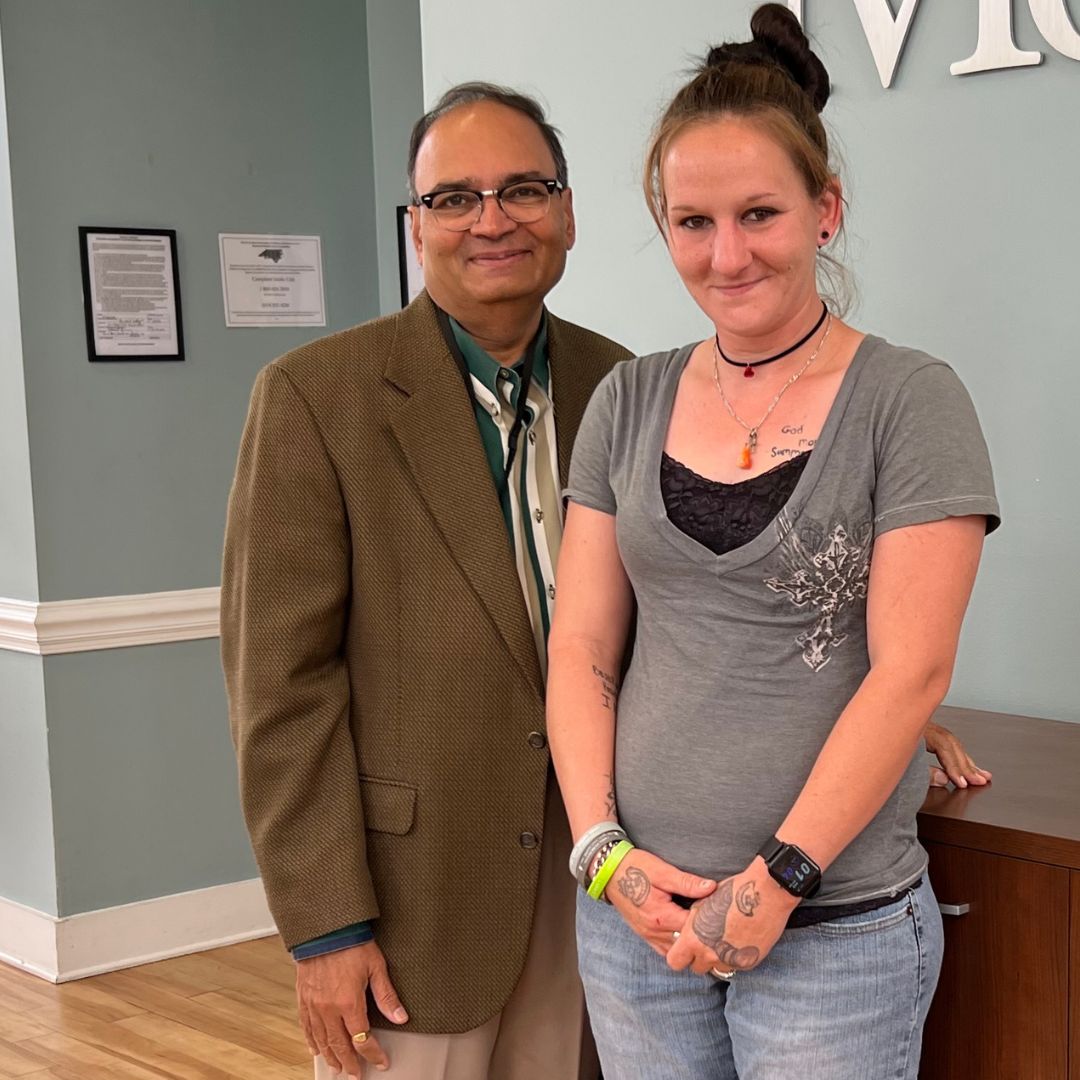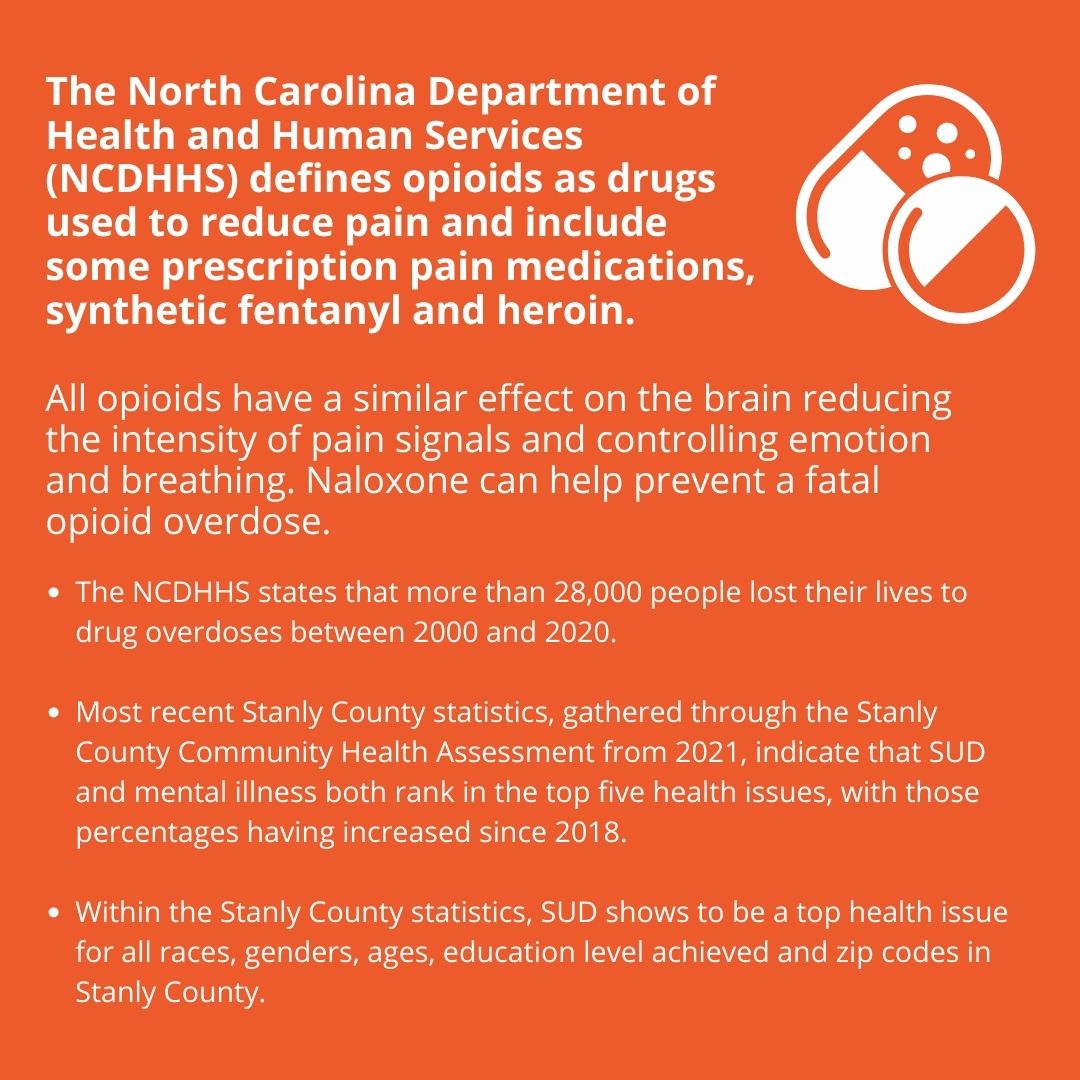Stanly County Resident Pursues Positive Mental Health with Monarch Resources
When Albemarle resident Billie Jean Bergquist didn’t know where to turn during difficult times of her life, she turned to drugs. When she realized this behavior was no longer helping her cope with traumatic life experiences, she turned to Monarch. Here is her story.
Billie Jean Bergquist, 32, reached out to Monarch for help when she faced difficult crossroads in her life because of substance use disorder (SUD) and mental illness.
At each of those turns, services and supports were in place to help her heal.
Billie Jean’s journey throughout her young life was difficult – and heartbreaking. At the age of 12 years old, she was raped. She didn’t tell anyone.
Her teen years were marred with cutting herself, smoking marijuana and using illegal drugs. Billie Jean experimented with drugs in hopes of being free of the pain she was feeling as the result of childhood trauma.
Eventually, others in her life showed her how to add cocaine, heroin and opioids to the array of substances she was already using.

Drugs would only provide a temporary relief, she admits. When the high wore off, she felt shame, embarrassment, hopelessness. The cycle would begin all over again.She left home at 17, became pregnant and lived with her baby’s father. She was clean from drugs for a while but eventually drifted back when caring for a young child and fighting the wish to feel numb became overwhelming. “I did everything and anything I could get my hands on,” she recalls about substances she used.
Her dad passed away six months after her son was born and she realized it affected her deeply. She turned to drugs to help numb the pain. Through the early years of her son growing up, she drifted in and out of sobriety. For a period of time, her young son resided with a family member because of her drug use. She knows what it feels like to experience homelessness.
Throughout her 20s, Billie Jean turned to Monarch for help, each time hoping to pursue recovery and end the pain she was feeling. In 2019, she walked through the doors one more time and was welcomed without judgement or made to feel embarrassed that she was again reaching out for help.
Since then, she has been working to maintain a drug-free life. She will admit that the road she is traveling has been bumpy and her recovery challenging. “I couldn’t ask for a better place to go to get help. They really want to help people if you listen and put what they say to work, it works,” she explains of the services she receives from Monarch.
Billie Jean uses Medication-Assisted Treatment (MAT), which is the use of medications in combination with counseling and other therapy to treat SUDs; individual and group behavioral health therapy; and Individual Placement and Supports (IPS), a person-focused, behavioral health service with employment supports.
Monarch staff who assist her in receiving treatment include Employment Support Professional Shailesh Gandhi; Behavioral Health Therapist Crystal Neal, LCMHC-A, LCAS-A; and Medical Director Dr. Robert McHale, M.D., M.Sc., DFAPA, ABPM, FASAM.
Dr. McHale explains that removing the substance use is one part of seeking mental health treatment. “Part of the recovery process is removing the substance use and that is the beginning. It is important to engage in treatment for the trauma so those underlying issues can be resolved. If not treated, the chance of recurrence will re-emerge,” he explains, noting that an SUD allows a person, for a time, to escape the trauma.
He applauds Billie Jean for continuing to seek treatment and recovering through a variety of services: “She is going about it in a good way and she is striving to make things better – learning about herself, growing, helping others. She uses relapses as a learning experience.”
Billie is proud of her sobriety and grateful for the services from which she is benefitting. “I didn’t know how to deal with things, and now with their help I am learning. Monarch is teaching me how to deal with things,” she says.
Focusing on her personal interests and making sure tools are in place to cope is an important aspect of recovery, she says. She has a “wellness shed” in her backyard based on the popular “she shed” concept. Billie has decorated a small structure in her backyard where she spends time listening to motivational speakers on YouTube, reading the Bible or crafting. She leans on her family, including her mom, fiancé and children, for support.
Her sobriety has motivated her in a way she never dreamed. Future goals include becoming a peer support specialist and helping others pursue sobriety through sharing her own experiences; completing her GED; owning a cleaning business; and becoming a mental health therapist.
What would Billie Jean say to others struggling to overcome an SUD or mental illness? “Just because it is bad now it will get better. You have to get through the storm so you will know how wonderful the sunshine feels because if it were always sunny you would take it for granted.”
For more information about Monarch services, visit here or call (866) 272-7826. To meet Billie Jean Bergquist and learn what being mentally healthy means to her, visit Monarch’s YouTube channel here.

MAT Acts as Tool to Fight Opioid Dependency
Monarch substance use disorder (SUD) services employ medication-assisted treatment (MAT) as an effective tool to help treat people seeking recovery. MAT is the use of medications in combination with counseling and behavioral health therapies as an effective way to treat opioid use disorders (OUD) and support recovery.
What is MAT?
The Federal Drug Administration (FDA) approved the following physician-prescribed and supervised treatment for opioid dependency: buprenorphine, methadone and naltrexone. These drugs, in combination with a variety of treatment including therapy, have proven successful. Monarch’s MAT program offers buprenorphine (Suboxone) and Naltrexone as part of MAT.
Medical Director Dr. Robert McHale, M.D., M.Sc., DFAPA, ABPM, FASAM, who is based in Monarch’s Stanly Behavioral Health Outpatient Clinic in Albemarle, explains that MAT is known as a harm-reduction model of SUD treatment, and Suboxone is given in either pill form or an oral film that is placed on the tongue.
How does MAT work?
Dr. McHale explains that for people using opioids, where the drugs are made or who is supplying them is an unknown which can add to the extreme danger of the substance use. Through the use of heroin and opioids, respiratory function can be negatively affected which is commonly seen during an overdose.

However, Suboxone is a controlled medication and does not prompt the same effects, and the potential for overdose is greatly reduced. Suboxone prevents withdrawal which can include nausea, vomiting, sweats and cravings.
“Typically, by the time an individual seeks treatment for an SUD, they are done with the euphoria or any benefits provided by the high,” Dr. McHale explains, noting that about 40-60 percent of people with mental health diagnoses have an SUD. “Once you control the substance, you can work on the other things like depression and anxiety.”
What makes Monarch’s program different?
The staff at Monarch’s Stanly clinic provide compassionate care without judgement despite how many times an individual has pursued recovery. “I have had people seeking recovery where something happens and they just are not ready for sobriety. Come back in a month. Come back in a year. You are welcome back,” says Dr. McHale.
Relapse while in the MAT program is common. “We want to be there for them when they are successful or when they relapse, to re-establish care. We treat anyone reaching out for help as a person with an understanding of the illness,” says Dr. McHale. “Regardless of cost, accessibility or ability to get medications, we are here to find that path. We will strive to find you the resources . . . Monarch’s MAT program is that we accept you for who you are and where you are to make it better.”
As a person in recovery heals through receiving a number of treatments along with MAT, provider and patient determine when and how to gradually reduce MAT services.
MAT services are currently provided in Monarch’s behavioral health outpatient clinics in Stanly and Nash Counties and soon available through the Mobile Integrated Care Clinics that travel in Gates, Nash, Hertford, Northampton, Bertie and Halifax counties. For more information, please call (866) 272-7826.
Posted on: Wednesday May 31, 2023
